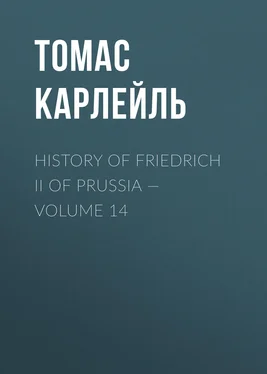Томас Карлейль - History of Friedrich II of Prussia — Volume 14
Здесь есть возможность читать онлайн «Томас Карлейль - History of Friedrich II of Prussia — Volume 14» — ознакомительный отрывок электронной книги совершенно бесплатно, а после прочтения отрывка купить полную версию. В некоторых случаях можно слушать аудио, скачать через торрент в формате fb2 и присутствует краткое содержание. Жанр: foreign_prose, История, literature_19, foreign_edu, foreign_antique, на английском языке. Описание произведения, (предисловие) а так же отзывы посетителей доступны на портале библиотеки ЛибКат.
- Название:History of Friedrich II of Prussia — Volume 14
- Автор:
- Жанр:
- Год:неизвестен
- ISBN:нет данных
- Рейтинг книги:5 / 5. Голосов: 1
-
Избранное:Добавить в избранное
- Отзывы:
-
Ваша оценка:
- 100
- 1
- 2
- 3
- 4
- 5
History of Friedrich II of Prussia — Volume 14: краткое содержание, описание и аннотация
Предлагаем к чтению аннотацию, описание, краткое содержание или предисловие (зависит от того, что написал сам автор книги «History of Friedrich II of Prussia — Volume 14»). Если вы не нашли необходимую информацию о книге — напишите в комментариях, мы постараемся отыскать её.
History of Friedrich II of Prussia — Volume 14 — читать онлайн ознакомительный отрывок
Ниже представлен текст книги, разбитый по страницам. Система сохранения места последней прочитанной страницы, позволяет с удобством читать онлайн бесплатно книгу «History of Friedrich II of Prussia — Volume 14», без необходимости каждый раз заново искать на чём Вы остановились. Поставьте закладку, и сможете в любой момент перейти на страницу, на которой закончили чтение.
Интервал:
Закладка:
OPENING OF THE OPERA-HOUSE AT BERLIN
December 7th, this Winter, Carnival being come or just coming, Friedrich opens his New Opera-House, for behoof of the cultivated Berlin classes; a fine Edifice, which had been diligently built by Knobelsdorf, while those Silesian battlings went on. "One of the largest and finest Opera-houses in the whole world; like a sumptuous Palace rather. Stands free on all sides, space for 1,000 Coaches round it; Five great Entrances, five persons can walk abreast through each; and inside—you should see, you should hear! Boxes more like rooms or boudoirs, free view and perfect hearing of the stage from every point: air pure and free everywhere; water aloft, not only for theatrical cascades, but to drown out any fire or risk of fire." [Seyfarth, i. 234; Nicolai, Beschreibung von Berlin, i. 169.] This is Seyfarth's account, still capable of confirmation by travelling readers of a musical turn. I have seen Operas with much more brilliancy of gas and gilding; but none nearly so convenient to the human mind and sense; or where the audience (not now a gratis one) attended to the music in so meritorious a way.
"Perhaps it will attract moneyed strangers to frequent our Capital?"—some guess, that was Friedrich's thought. "At all events, it is a handsome piece of equipage, for a musical King and People; not to be neglected in the circumstances. Thalia, in general,—let us not neglect Thalia, in such a dearth of worshipable objects." Nor did he neglect Thalia. The trouble Friedrich took with his Opera, with his Dancing-Apparatus, French Comedy, and the rest of that affair, was very great. Much greater, surely, than this Editor would have thought of taking; though, on reflection, he does not presume to blame. The world is dreadfully scant of worshipable objects: and if your Theatre is your own, to sweep away intrusive nonsense continually from the gates of it? Friedrich's Opera costs him heavy sums (surely I once knew approximately what, but the sibylline leaf is gone again upon the winds!)—and he admits gratis a select public, and that only. [Preuss, i. 277; and Preuss, Buch fur Jedermann, i. 100.] "This Winter, 1742-43, was unusually magnificent at Court: balls, WIRTHSCHAFTEN [kind of MIMIC FAIRS], sledge-parties, masquerades, and theatricals of all sorts;—and once even, December 2d, the new Golden Table-Service [cost of it 200,000 pounds] was in action, when the two Queens [Queen Regnant and Queen Mother] dined with his Majesty."
FRIEDRICH TAKES THE WATERS AT AACHEN, WHERE VOLTAIRE COMES TO SEE HIM
Months before that of the Opera-House or those Silesian settlements, Friedrich, in the end of August, what is the first thing visible in his Domestic History, makes a visit, for health's sake, to Aachen (Aix-la-Chapelle so called), with a view to the waters there. Intends to try for a little improvement in health, as the basis of ulterior things. Health has naturally suffered a little in these War-hardships; and the Doctors recommend Aix. After Wesel, and the Westphalian Inspections, Friedrich, accordingly, proceeds to Aix; and for about a fortnight (23th August-9th September) drinks the waters in that old resting-place of Charlemagne;—particulars not given in the Books; except that "he lodged with Baege" (if any mortal now knew Baege), and did an Audience or so to select persons now unknown. He is not entirely incognito, but is without royal state; the "guard of twenty men, the escort of 160 men," being no men of his, but presumably mere Town-guard of Aix coming in an honorary way. Aix is proud to see him; he himself is intent on the waters here at old Aix:—
Aquisgranum, urbs regalis,
Sedes Regni principalis:—
My friend, this was Charlemagne's high place; and his dust lies here, these thousand years last past. And there used to soar "a very large Gilt Eagle," ten feet wide or so, aloft on the Cathedral-steeple there; Eagle turned southward when the Kaiser was in Frankenland, eastward when he was in Teutsch or Teuton-land; in fact, pointing out the Kaiser's whereabouts to loyal mankind. [Kohler, Reichs-Historie. ] Eagle which shines on me as a human fact; luminously gilt, through the dark Dryasdustic Ages, gone all spectral under Dryasdust's sad handling. Friedrich knows farther, that for many centuries after, the "Reich's INSIGNIA (REICHS-KLEINODIEN)" used to be here,—though Maria Theresa has them now, and will not give them up. The whole of which points are indifferent to him. The practical, not the sentimental, is Friedrich's interest;—not to say that WERTER and the sentimental were not yet born into our afflicted Earth. A King thoroughly practical;—yet an exquisite player on the flute withal, as we often notice; whose adagio could draw tears from you. For in himself, too, there were floods of tears (as when his Mother died); and he has been heard saying, not bragging but lamenting, what was truly the fact, that "he had more feeling than other men." But it was honest human feeling always; and was repressed, where not irrepressible;—as it behooved to be.
Friedrich's suite was not considerable, says the French spy at Aix on this occasion; pomp of Entrance,—a thing to be mute upon! "Came driving in with the common post-horses of the country; and such a set of carriages as your Lordship, intent on the sublime, has no idea of." [Spy-Letter, in Campagnes des Trois Marechaux, i. 222.] Rumor was, His Britannic Majesty was coming (also on pretext of the waters) to confer with him; other rumor is, If King George came in at one gate, King Friedrich would go out at the other. A dubious Friedrich, to the French spy, at this moment; nothing like so admirable as he once was!—
The French emotions (of which we say little), on Friedrich's making Peace for himself, had naturally been great. To the French Public it was unexpected, somewhat SUDDEN even to the Court; and, sure enough, it was of perilous importance in the circumstances. Few days ago, Broglio (by order given him) "could not spare a man," for the Common Cause;—and now the Common Cause has become entirely the Broglio one, and Broglio will have the full use of all his men! "Defection [plainly treasonous to your Liege Lord and Nation]! horrible to think of!" cried the French Public; the Court outwardly taking a lofty tragic-elegiac tone, with some air of hope that his Prussian Majesty would perhaps come round again, to the side of his afflicted France! Of which, except in the way of helping France and the other afflicted parties to a just Peace if he could, his Prussian Majesty had small thought at this time.
More affecting to Friedrich were the natural terrors of the poor Kaiser on this event. The Kaiser has already had his Messenger at Berlin, in consequence of it; with urgent inquiries, entreaties;—an expert Messenger, who knows Berlin well. So other than our old friend, the Ordnance-Master Seckendorf, now titular Feldmarschall,—whom one is more surprised than delighted to meet again! Being out with Austria (clamoring for great sums of "arrears," which they will not pay), he has been hanging about this new Kaiser, ever since Election-time; and is again getting into employment, Diplomatic, Strategic, for some years,—though we hope mostly to ignore him and it. Friedrich's own feeling at sight of him,—ask not about it, more than if there had been none! Friedrich gave him "a distinguished reception;" Friedrich's answer sent by him to the Kaiser was all kindness; emphatic assurance, "That, not 'hostility' by any means, that loyalty, friendship, and aid wherever possible within the limits, should always be his rule towards the now Kaiser, lawful Head of the Reich, in difficult circumstances." ["Audience, 30th July" (Adelung, iii. A, 217).] Which was some consolation to the poor man,—stript of his old revenues, old Bavarian Dominions, and unprovided with new; this sublime Headship of the Reich bring moneyless; and one's new "Kingdom of Bohemia" hanging in so uncertain a state, with nothing but a Pharsalia-Sahay to show for itself!—
Читать дальшеИнтервал:
Закладка:
Похожие книги на «History of Friedrich II of Prussia — Volume 14»
Представляем Вашему вниманию похожие книги на «History of Friedrich II of Prussia — Volume 14» списком для выбора. Мы отобрали схожую по названию и смыслу литературу в надежде предоставить читателям больше вариантов отыскать новые, интересные, ещё непрочитанные произведения.
Обсуждение, отзывы о книге «History of Friedrich II of Prussia — Volume 14» и просто собственные мнения читателей. Оставьте ваши комментарии, напишите, что Вы думаете о произведении, его смысле или главных героях. Укажите что конкретно понравилось, а что нет, и почему Вы так считаете.









